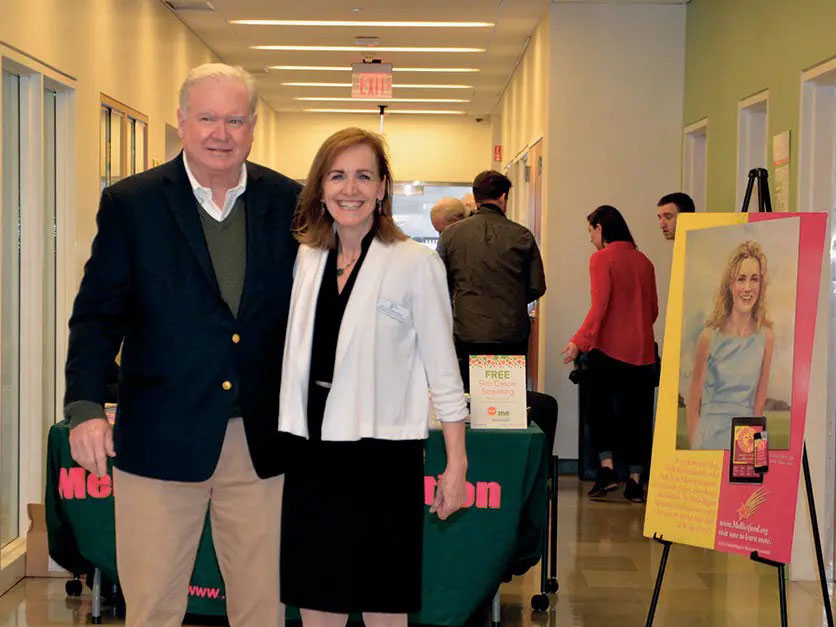May 28, 2023
Molloy Professor Develops Screening Protocols For Skin Cancer
By Lisa L. Colangelo, Newsday
Mollie Biggane was a healthy, active 20-year-old who played soccer and tennis while growing up in Garden City. She had no idea the unusual mole behind her leg would turn out to be a deadly form of skin cancer known as melanoma.
By the time she was diagnosed, the cancer had progressed. Six months of treatments and surgeries were not able to stop it.
Since her death in 2000, Biggane's family has focused on bringing awareness to skin cancer in hope of sparing another family from the grief it went through.
 Siegel, a professor of nursing at Molloy University, has helped develop the screening protocols that will be employed at Stony Brook and has been implemented at other Long Island hospitals.
Siegel, a professor of nursing at Molloy University, has helped develop the screening protocols that will be employed at Stony Brook and has been implemented at other Long Island hospitals.
"Nurses are so involved in teaching people about healthy behaviors, such as proper nutrition and safety for children,” Siegel said. “This is a chance to teach them about sun-safe behaviors, checking their skin and going to a doctor if they think something’s wrong with their skin."
Years of exposure to ultraviolet rays from the sun, tanning beds or sunlamps can lead to skin cancer, according to the Centers for Disease Control and Prevention. Estimates quoted by the American Academy of Dermatology show about 9,500 people in the United States are diagnosed with skin cancer every day.
“Skin cancer accounts for more cancer than all the cancers combined,” said Biggane's mother, Maggie Biggane. “Anyone who has skin can get it and, to a large extent, it's preventable.”
Melanoma, the most serious form of skin cancer, can spread to the lymph nodes and internal organs. It is highly treatable when detected early, according to the American Academy of Dermatology.
“Young people never think it's going to happen to them,” said Maggie Biggane, who created the nonprofit with Mollie's father, Jack, and their children, Cara, Julie and Jack.
Screenings could lead to referrals
Maggie Biggane said awareness of skin cancer has vastly improved since Mollie first noticed the unusual mole on the back of her leg.
“It had all the hallmarks [of skin cancer],” Biggane said. “It was bleeding. Now we know that’s a warning sign.”
With her reddish-blond hair and fair skin, Mollie wasn’t a sun-worshipper, her mom said. But she was captain of her tennis team and played travel soccer.
“Did we use sunscreen? Yes. Were we vigilant about it? Probably not,” Biggane said. “We had an umbrella, but that doesn’t compare to the SPF clothing parents are putting on their kids today.”
Mollie's Fund works on educational programs, public service announcements and other efforts to remind people to be mindful of sun exposure and to always wear sunscreen.
The hospital initiative is a "natural extension" of the screenings that nurses do for all new patients, said Carolyn Santora, chief nursing officer at Stony Brook University Hospital.
“Currently, when patients are admitted to the hospital, nurses do a full skin assessment,” Santora said.
“We are looking for pressure ulcers, bruises, rashes and other skin conditions. A natural extension of that skin assessment is to observe for moles and talk to the patients about their history, how much sun exposure they have had over time, and whether or not they use sunscreen. Risk of skin cancer increases with the amount of unprotected sun exposure over time."
Santora said nurses also will use the opportunity to explain to patients the importance of protecting themselves from the sun’s rays.
If the nurses see an unusual mole or skin lesion, or if the patient relates a concern, they can be referred to a dermatologist for further examination and possible treatment.
Siegel said people should be mindful of the sun but not feel like they can't go outside.
"Be smart about it," she said. "Cover your skin with clothing. Wear a wide 4-inch brim hat, wear sunscreen and never go tanning."